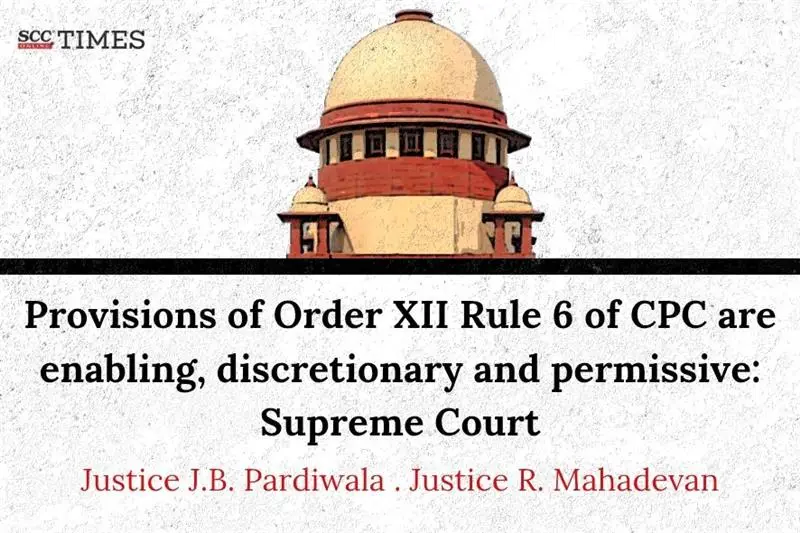Supreme Court: While considering the instant petition challenging Calcutta High Court’s decision to affirm a decree of eviction; the Division Bench of J.B. Pardiwala and R. Mahadevan, JJ., delved into the technicalities of Order XII Rule 6 of the CPC and relying on relevant precedents, said that primary object of Rule 6 is to enable a party to obtain speedy judgment at least to the extent of admission. The Court further stated that provisions of Rule 6 are enabling, discretionary and permissive. They are not mandatory, obligatory or peremptory. This is also clear from the use of the word “may” in the rule. The powers conferred on the Court by Rule 6 are untrammelled and cannot be crystallized into any rigid rule of universal application.
The Court further affirmed the interpretation of Order XII Rule 6 of the CPC by Delhi High Court in ITDC Limited v. Chander Pal Sood1, wherein the High Court had pointed out that Order XII, Rule 6 gives a very wide discretion to the Court. Under this rule the Court may at any stage of the suit either on the application of any party or of its own motion and without determination of any other question between the parties can make such order giving such judgment as it may think fit on the basis of admission of a fact made in the pleadings or otherwise whether orally or in writing. “Rule 6 permits the Court to pass judgment on the basis of the statement made by the parties not only on the pleadings but also dehors the pleadings i.e. either in any document or even in the statement recorded in the Court”.
Background:
It appeared from the record that the respondent (plaintiff) was the lawful owner of the suit premises in which the petitioner (defendant) claimed to be the lawful tenant. The plaintiff instituted title suit for recovery of possession and mesne profits against the defendant.
The deceased father of the defendant was a regular and original tenant under the plaintiff in respect of the suit premises at a monthly rent of Rs. 1700 including corporation taxes. It appeared from the record that the defendant being the son of the original tenant was residing in the suit premises up to the date of demise of his father.
The plaintiff served a notice dated to the defendant informing him that since the original regular tenant, passed away and the defendant being the son of the regular tenant who at the time of demise of the regular tenant was residing in the scheduled property, he can at best take the benefit of his statutory right of inherited tenancy up to 5 years from the date of death of his father. The notice further informed the defendant that he cannot be regarded as tenant within Section 2(g) of the West Bengal Premises Tenancy Act, 1997.
Upon no receipt of any satisfactory reply from the defendant’s side, the plaintiff had to institute the title suit for recovery of the possession. The defendant filed his written statement and in the same he is said to have admitted few facts arising thereof. The defendant admitted the fact that the regular tenant died in 2016 leaving him as the sole heir and legal representative; and that the plaintiff is the owner of the scheduled property and the rent was paid till May 2021 to the plaintiff.
In view of the aforesaid admissions made by the defendant in his written statement, the plaintiff preferred an application before the Trial Court under Order XII Rule 6 of the Civil Procedure Code, 1908 and prayed for a decree upon admission. The Trial Court adjudicated the application and ultimately decreed the suit having regard to the specific admissions made by the defendant.
The defendant being dissatisfied with the decree passed by the Trial Court based on admissions challenged the same before the High Court; however, the High Court affirmed the Trial Court’s decision. Therefore, the defendant approached the Supreme Court via the instant petition.
Court’s Assessment:
Perusing the matter, the Court noted that the plain reading of Section 2(g) of the West Bengal Premises Tenancy Act, 1997, indicated that the dependent heir of the original tenant unless she is the widow of the original tenant would be entitled to carry on as a tenant in such capacity for a period of 5 years from the demise of the original tenant. In the instant case the defendant is the son of the original tenant. It is not in dispute that the defendant claims his right to continue as a tenant in the suit premises through his father i.e. the original tenant.
Examining Order XII Rule 6 of the CPC, the Court noted that in 1976, the original Rule 6 was substituted and redrafted into sub-rule (1) and Sub-rule (2) had been newly inserted. Rule 6, as originally enacted, enabled a court to pronounce judgment or admission “either in pleading or otherwise. The Law Commission considered the provision. With a view to clarify the position as to admission and also to empower the court to pronounce a judgment: suo motu and to draw a decree on such judgment, recommended to modify the rule.
Rule 6(1) now empowers the Court to pronounce a judgment upon admissions made by parties without waiting for the determination of other questions. While Rule 6(2) states that a decree shall be drawn up in accordance with the judgment.
Referring to Uttam Singh v. United Bank of India, (2000) 7 SCC 120, the Court stated that the primary object underlying Rule 6 is to enable a party to obtain speedy judgment at least to the extent of admission. Where a plaintiff claims a particular relief or reliefs against a defendant and the defendant makes a plain admission, the former is entitled to the relief or reliefs admitted by the latter.
Powers under Rule 6 can be exercised keeping in view and having regard to the facts and varying circumstances of each case. “If the court is of the opinion that it is not safe to pass a judgment on admissions, or that a case involves questions which cannot be appropriately dealt with and decided on the basis of admission, it may, in exercise of its discretion, refuse to pass a judgment and may insist upon clear proof of even admitted facts”.
The Court explained that after the amendment in Rule 6, the admissions are not confined to Rule 1 or Rule 4 of Order 6 but are of general application. Such admissions may be express or implied (constructive); may be in writing or oral; or may be before the institution of the suit, after the suit is brought or during the pendency of proceedings.
Considering ITDC Limited (supra), the Court said that if one of the parties’ statement is recorded under O. 10, Rr. 1 and 2 of the Code of Civil Procedure, the same is also a statement which elucidates matters in controversy. Any admission in such statement is relevant not only for the purpose of finding out the real dispute between the parties but also to ascertain as to whether or not any dispute or controversy exists between the parties. Admission if any is made by a party in the statement recorded, would be conclusive against him and the Court can proceed to pass judgment on the basis of the admission made therein.
Since the object of Rule 6(1) is to enable the plaintiff to get judgment on admission of the defendant to the extent of such admission, he must get the benefit thereof immediately without waiting for the determination of “non-admitted claim”. Rule 6(2) makes it imperative for the Court to draw up a decree in terms of judgment on admission which can be executed by the plaintiff.
Therefore, the Court opined that Calcutta High Court did not commit any error of law in decreeing the suit applying Order XII Rule 6 of the CPC on account of clear and unequivocal admission made by the defendant in his written statement. Hence, the Court deemed it fit to dismiss the petition.
CASE DETAILS
|
Citation: Appellants : Respondents : |
Advocates who appeared in this case For Petitioner(s): For Respondent(s): |
CORAM :
1. (2000) 84 DLT 337 (DB)








